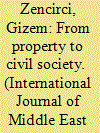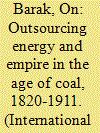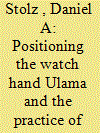|
|
|
Sort Order |
|
|
|
Items / Page
|
|
|
|
|
|
|
| Srl | Item |
| 1 |
ID:
140357


|
|
|
|
|
| Summary/Abstract |
Following the 1990–91 Gulf War and the subsequent March 1991 uprising, the Iraqi government launched a brutal counterinsurgency campaign in the marshes of southern Mesopotamia. Alongside mass killing and forced population resettlement, the state used hydrological infrastructure to divert water from the wetlands, permanently desiccating the area. Using newly available Iraqi government archives, this paper argues that the destruction of the marshes was the result of a complex interplay between sectarianism, development planning, and security imperatives. Inhabited by peripatetic Marsh Arabs (Maʿdan), the marshlands stood out as an impenetrable wilderness. Baʿth policies in the marshes combined measures meant to promote social and economic modernization with counterinsurgency tactics meant to achieve control over the marsh region. After 1991, the regime set out to obliterate a terrain it deemed a strategic liability and a population that seemed an obstacle to modernization.
|
|
|
|
|
|
|
|
|
|
|
|
|
|
|
|
| 2 |
ID:
140361


|
|
|
|
|
| Summary/Abstract |
In this article, I argue that shifting development discourses have shaped the meaning and function of vakıfs (religious endowments) in Turkey since the establishment of the republic in 1923. I identify three periods defined by their distinctive development discourse, and show how each of these discourses made vakıfs into both an object and a site of development. In the etatist discourse of the 1930s, vakıfs were articulated as national treasures tasked with financing state-led economic development. With the shift to a mixed economy discourse in the 1960s, vakıfs were reconfigured as private philanthropic foundations expected to create a skilled labor force. The neoliberal development discourse of the 1980s transformed vakıfs into welfare organizations focused on poverty. This article shows that in all three of these periods, the relationship between state, Islam, economy, and society was articulated, legitimized, and consolidated with reference to a seemingly stagnant but in fact malleable institution inherited from the Ottoman Empire—the vakıf. I refer to this process as the “local production of development,” a conceptualization emphasizing how global discourses of development are formed and transformed at the local level.
|
|
|
|
|
|
|
|
|
|
|
|
|
|
|
|
| 3 |
ID:
140356


|
|
|
|
|
| Summary/Abstract |
During the long 19th century, British coal proliferated throughout the Ottoman Empire in increasing quantity, rapidity, and regularity via junctions and political arrangements that became evermore stable and dominant. The British used coal export to project their power elsewhere, offshoring the Industrial Revolution by building an infrastructure that could support it overseas and connect it to existing facets of the imperial project. Examining this “outsourcing” and the importance of foreign coal markets to industrialization helps provincialize the steam engine and anchor it in a global context. It also allows us to explore the impact of fossil energy on the Middle East and the ways coal both set the stage for the arrival of oil and informed the possibilities for translating carbon power into politics. Coal, the article suggests, animated political participation in England while reinforcing authoritarian tendencies in the Middle East.
|
|
|
|
|
|
|
|
|
|
|
|
|
|
|
|
| 4 |
ID:
140359


|
|
|
|
|
| Summary/Abstract |
This article explores the role of the ʿulamaʾ in shaping the use of mechanical timepieces in Cairo in the 18th and 19th centuries. Ottoman interest in new technologies in this period is often understood in relation to the emergence of modernization projects and new scientifically trained actors, with a corresponding decline in the status of the ʿulamaʾ. However, the vogue of mechanical timepieces in Cairo allowed ʿulamaʾ trained in the very old tradition of mīqāt (astronomical timekeeping) to make their knowledge speak in new ways to new audiences. Based on several manuals and tables that such scholars wrote “on the position of the watch hand,” this article shows how ʿulamaʾ not only facilitated distinctively Ottoman timekeeping conventions, but also furthered an understanding of watches as instruments of precision. The article builds on a growing literature on Ottoman temporality, while expanding our historical view of ʿulamaʾ and their authority, of the material culture of Cairo, and of science and technology in an Islamic context.
|
|
|
|
|
|
|
|
|
|
|
|
|
|
|
|
| 5 |
ID:
140360


|
|
|
|
|
| Summary/Abstract |
This article analyzes the ideas of the Turkish sociologist and political activist Ziya Gökalp (1876–1924) in order to reevaluate the secularization politics of the Young Turks. A close reading of Gökalp's publications on Islamic institutional reform challenges homogenizing modernist interpretations of late Ottoman reform in general. Gökalp's legacy has often been judged through a secularist-Islamist binary. This article suggests that Gökalp's approach to the problem of Islam and of religion more broadly within the modern state was more complex than generally argued. His understanding of concepts such as shariʿa, dīn, and the Islamic state was not yet subordinated to a secularist episteme that juxtaposes the religious and the secular. Rather, Gökalp strove for a social and political order in which religious norms and modern institutions complemented each other harmoniously.
|
|
|
|
|
|
|
|
|
|
|
|
|
|
|
|
| 6 |
ID:
140358


|
|
|
|
|
| Summary/Abstract |
Focused on the contest over water management in Nazareth during the early years of Israeli statehood (1948–56), this article traces the negotiations that took place between Palestinian residents of Nazareth and Israeli state authorities. I argue that the struggle over this vital natural resource, in a region where it is in short supply was in some measure a matter of fulfilling practical needs, but it was also part of the process of negotiating citizenship. The story of Nazareth's water in the early Israeli period is thus a microcosm of the incorporation of Palestinians as undesired and marginalized citizens into a self-defined Jewish state. Challenging the Palestinian resistance/collaboration dichotomy and the notion of a monolithic Israeli state, I show how both Palestinian citizens and Israeli authorities adopted wide-ranging positions on water management and its broad political implications. Although Palestinian citizens were able to use the space made available through citizenship to further their collective interests, they were ultimately unable to overcome the exclusions inherent to a political system that maintained the dominance of a Jewish majority over a Palestinian minority.
|
|
|
|
|
|
|
|
|
|
|
|
|
|
|
|
|
|
|
|
|